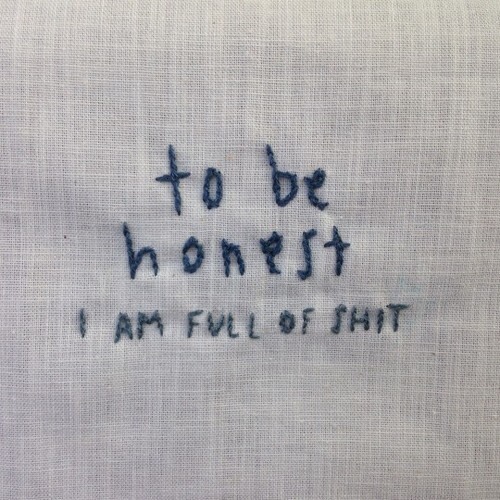I've talked a bit in the past about how I like to map out everything about my fictional worlds before I write them, but there is one big exception to that rule. I say a lot with regard to fiction that "questions are more interesting than answers" and, because I believe that, I like to leave big unanswered questions at the center of my stories. In a way, I suppose this choice is almost ritualistic on my part, like the deliberate imperfection stitched into an oriental rug. It's deeply tied to my strong personal belief that to be alive is often to live without answers, to pave a path forward even in the absence of closure. For that reason, I sometimes like to leave certain central questions unanswered even to myself. I suppose it feels like a betrayal of the message for me to know the answer.
But my playwright mentor disagrees, and she wants me to give her my answer the central question! So now I have to think of one (maybe the real reason I avoid answers - laziness!). And the problem is that no one particular answer feels like the correct one. Now I have some, shall we say,
funky beliefs (at least relative to mainstream views) about reality. I am an immaterialist, an antipositivist, and an intersubjectivist (*psst* I can hear your eyes rolling, stop it). Even these philosophical positions I do not think of so much as hard opinions or statements about reality (for example, I don't feel it is a valuable pursuit to try to convince someone else to be an immaterialist) but as the frameworks I use to navigate the world for myself because they are the ones that have afforded me the most success in doing so (oh yeah, I'm also a bit of a Jamesian pragmatist). These frameworks shape every inch of my writing, which explore limited perspectives (unreliable narrators ftw), intimate internal experiences, and complex relationships between subjects with something of a pointed disregard for "what really happened."
But, anyway, I am waxing philosophical, and probably doing so unnecessarily. Because there actually
is a character in my play who knows the answer to the central question. He just happens to be dead. And the central question happens to be the circumstances around his death. So rather than laying out some objective narrative of "what happened," I can just write my account of what he experienced in the moments leading up to his death. At the time the main story takes place, no living person knows what happened. But somebody who was alive once did know. Thus I am forced to remind myself that the tragedy is not in a question that has no answer, but in a question that
has an answer, but it is an answer which can no longer be known. The death of the one character that did know put an end to his reality and his truth and relegated what was once very real to a sealed bubble of history that, despite the ripples that continue to emanate from it, nobody from that point forward can ever access. It's an event horizon. But the fact that we can never see inside a black hole doesn't mean nothing is inside it. It just means that what is inside will be forever unknowable to those on the outside.
As an author, I have taken to limiting my own knowledge to that which can exist outside of the black hole, since that is where my stories take place and the reality that all of my characters exist in. But, at the same time, the author has the privileged position to be able to peek inside the black hole because our true position is one of neither inside nor outside, but
above. With respect to our fictional universes, we are extradimensional beings who can observe wherever we please.
But the big question is: how does this affect the way we tell the story? Because I'm not convinced that the story can possibly be the same story before and after the author takes a peek beyond the event horizon. The differences might be subtle, but they would be significant nevertheless. The simple fact of someone outside the story knowing something those inside of it do not necessarily creates dramatic irony even where none is wanted.
On the other hand, the actor can still portray a character's ignorance of the plot despite she herself having privileged insights into the plot and other characters that the character doesn't have. This can be achieved through compartmentalization in the case of method acting or just skillful facsimile (as Lawrence Olivier said, "Why don't you just try acting?"). But, at the same time, there is no denying that some of the best bits of acting in film and television have come from cases in which the actor was genuinely surprised. Where the real ending was kept from them until the moment of filming, or another actor hit them with a line that was unscripted but directed. So, how does this tie in with writing?
Obviously, I'm not going to be a brat. I'm going to write the damn backstory because I'm not an arrogant little shit who's about to argue with the seasoned professional giving me free advice. I firmly believe in the learning the rules before breaking them. But it just had me thinking. And I never thought I'd say this, but maybe I need to do a little less of that these days. At this rate, I'll turn into a postmodernist. They warned me that this would happen when I started fucking with the humanities. Goddamn black magic.

